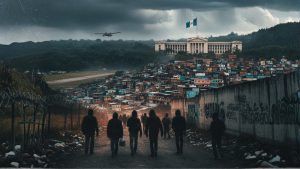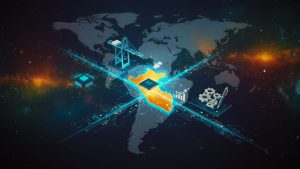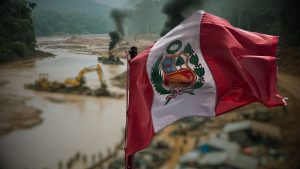Summary
The multiple crises currently playing out in Ukraine, the Middle East, the Taiwan straits, and even Guyana’s Essequibo region, reflect a deterioration of the rules-based international order that has served as the foundation for economic growth, technological progress, and the limitation of interstate conflict since the end of the Second World War. The current deterioration is a product of the expansion of PRC economic and other power as the country pursues its interests, complimented by the enabling effect of that pursuit on a range of illiberal states, with distinct agendas, but united by a common interest in limiting the constraints of that order as they pursue their own interests. Over the long run, the deterioration of the rules-based order undermines democracy and economic progress and facilitates transnational crime and domestic conflict. It may also expand the frequency of inter-state conflict, even in Latin America, in a system in which militarily “stronger” authoritarian regimes increasingly lack constraint in taking what they want from their weaker neighbors. Governments in the region may rediscover the relevance of their militaries in defending the nation against external, as well as environmental, criminal, and internal challenges.
Keywords: People’s Republic of China, Rules-Based World Order, Illiberal Governments.
Contemporary Challenges: Global Threats and Tensions in 2024
2024 begun with Venezuelan threats to forcibly annex Guyana’s Essequibo region,[1] and attempts by Ecuadoran narco gangs to use terrorism[2] to destabilize that nation’s government. These developments came on top of 2023’s news of PRC espionage facilities[3] and possible military training[4] in Cuba, negotiation by anti-US authoritarian regimes in Venezuela, [5] Nicaragua,[6] and Bolivia[7] of security cooperation activities with Russia[8] and Iran,[9] and even permission by the leftist Lula government in Brazil, to permit one of Iran’s biggest warships, the Makran, to put into port in Rio de Janeiro.[10] These events in Latin America are part of a broader deterioration of the rules-based global order, driven by a combination of escalating challenges, poor government performance, China’s growing capabilities and assertiveness, and its empowerment of a diverse array of increasingly emboldened illiberal regimes across the world.
The system of political and economic institutions established by the victorious allied powers at the end of World War II created the framework for transformational commercial, informational, and political interdependence in the 80 years that followed. The emergent “rules-based international order,”[11] symbolized by the agreements of the 1944 Bretton Woods conference,[12] was never universally implemented, less accepted. The changes it brought were disruptive, particularly for lesser developed societies. Its effect on conflict, development, and inequality have been widely debated. Nonetheless, however imperfect, the order provided a framework for coordination on legal, technical, and commercial issues that provided the predictability and risk mitigation required to construct new global systems of logistics, communication, and financial management that enabled contemporary global interconnectivity and interdependence. As a compliment, vehicles for political and security coordination, funded and enforced disproportionately by the U.S. and the West, reduced the incidence of interstate warfare (although not internal violence), particularly in the post-Cold War era.
The rules-based international order was also instrumental to the transformation of the PRC into a modern power, allowing it to leverage international logistics, financial and data and communications connectivity to become the world’s premier hub for industrial production, accumulating the wealth and technology it required to project itself onto the World stage.
Ironically, as PRC wealth and power expanded, it has pursued its interests in ways that increasing undermine the very system that enabled its rise, with increasingly catastrophic global effects. While the PRC has sought to avoid explicitly anti-U.S. alliances and provocations that might undermine its commercial interests, it has pursued a self-interested “non-judgmental” international relations posture enormously beneficial and attractive to illiberal states. The PRC has supported its companies global pursuit of resources, markets, technology and commercial opportunity, reaping the side benefit that such pursuits have also weakened commitments to democracy, rule-of-law and close relations with the U.S. among PRC business partners.
The PRC has become the principal bankroller of authoritarian regimes from Russia to Iran to Venezuela, indirectly enabling their challenges to the liberal international order. It has profited handsomely from buying Russian oil and foodstuffs at a discount, selling it helicopters, drones and other military goods, and providing it financial vehicles for escaping U.S. sanctions. The PRC has similarly served as a key purchaser of oil from the sanctioned Iranian regime, behind the October 7, 2022 Hamas terrorist attacks that murdered over 1,200 Israelis, as well as behind the international terrorist group Hezbollah, and the Houthis in Yemen, who continue to use Iranian-supplied Chinese missiles and drones to attack US and Israeli targets and commercial shipping in the region. The PRC was similarly key in bankrolling and providing security and technical support to the authoritarian populist regimes of Hugo Chavez and now Nicholas Maduro in Venezuela as they eliminated the democratic opposition and projected both criminal and subversive networks into the region.
The PRC is not consciously hijacking democracies, but rather, contributes to the survival of illiberal regimes through the pursuit of its economic and strategic interests. Other contributors to the spread of illiberal regimes, and thus the deterioration of the rules-based international order, include the reinforcing effects of criminality, corruption, inequality, the stresses of Covid-19, and the polarizing and distorting effects of social media, all contributing to frustrations among populations with the performance of liberal democracies, coupled with openness to change that, all too often, brings something far worse.
The proliferation of illiberal regimes is not just an academic matter. It is beginning to erode the foundations of the rules-based international order that have underpinned global prosperity and security, however imperfectly, for almost a century.
In the domain of law enforcement, the increasing number of regimes harboring criminals and permitting or directly engaged in criminal activity, including Venezuela and Nicaragua, in addition to simply weak or corrupted states, greatly complicates the fight against organized crime, already challenged by expanding cocaine production, fentanyl, illegal mining, and human trafficking involving growing international refugee problems. Within increasingly international criminal networks, the struggle is further complicated by new forms of money laundering[13] involving Chinese criminal organizations[14] and PRC-based financial institutions.
Even more worrisome than new challenges and obstacles in the struggle against organized crime, the deterioration of the rules-based order threatens to unleash a new era of interstate conflict, fundamentally changing global security dynamics and the calculations of democracies and illiberal states alike.
Russia’s invasion of the Ukraine, appears poised for significant Russian successes in 2024,[15] signaling to the world[16] that the ability of divided democracies to successfully unite against a determined illiberal aggressor is not enduring in the current world order, and that a stronger state can decimate and seize the territory and resources of a weaker state and get away with it.
In the Middle East, the lack of sustained international outcry[17] against Hamas’ premeditated and celebrated murder of 1,200 Israelis highlights Israel’s lack of alternatives to taking its security into its own hands. The ongoing attacks by the Houthis against international shipping in the Red Sea without significant international response,[18] has forced multiple international cargo carriers to stop using the route,[19] illustrating the erosion of international consensus and mechanisms to forcibly respond to outlaw groups threatening key nodes of the global economy.
In the Indopacific, the PRC, through its “10-dash-line,”[20] has asserted claims to the territorial waters of its neighbors, ignoring an international court ruling[21] against those claims in 2016, and has now deployed its Coast Guard and the Chinese “maritime militia” to forcibly intervene against the commercial and military ships of others in those contested waters, including using lasers[22] to blind them, water cannons,[23] and even ramming them.[24]
In Latin America, the Maduro dictatorship has manufactured a crisis,[25] over a claim that it lost in an international tribunal 125 years ago, over 2/3 of the territory, of its militarily far weaker neighbor Guyana and its oil, mining and timber wealth, without incurring substantial condemnation[26] in the region against Venezuelan aggression.
For states in Latin America and throughout the globe, the lesson is increasingly clear: The mechanisms of the international system to collectively call out and address wrongdoing, are crumbling, accelerated by a PRC that bankrolls and protects regimes that advance its interests, independent of their behavior, and a divided, gun-shy United States that can no longer be counted on to consistently use its power to stay in the fight against aggression.
With the deterioration of the international system to collectively respond to aggression, the only factor restraining Xi Jinping from forcibly ending Taiwanese autonomy[27] may be his caution over unleashing a devastating global war or economic crisis.
The effects of the eroded international response against international aggression will be broad and multifaceted. They may include further Russian grey zone operations and military adventures against its European neighbors, “unilateral” actions by governments in the Middle East, Africa and Asia against “terrorists” in the territory of its neighbors, or Latin American authoritarian states such as Venezuela and Nicaragua forcibly threatening or seizing territory from their weaker neighbors. The effects will be enormously expensive and destabilizing all sides. All will be obliged to acquire more arms, including nuclear weapons in some cases, to defend what the international order can no longer be counted on to protect.
The new reality will strengthen the partnership of illiberal states disposed to unilaterally impose their will, with a PRC happy to bankroll them and profit from their aggression. It is still not too late for the United States to act more decisively against aggression by predatory illiberal regimes, while also working to secure greater partner contributions effectively communicating the cost if that order collapses. The alternative is the deterioration of the global system into what 17th Century political philosopher Thomas Hobbes termed the “state of nature” in which life is “solitary, poor, nasty, brutish and short.” [28]
Endnotes:
- Simmone Shah, Armani Syed and Mallory Moench, “What to Know About Venezuela’s Move to Claim Guyana’s Essequibo Region”, Time (December 11, 2023), https://time.com/6343549/guyana-essequibo-region-venezuela-dispute/ ↑
- Dan Collyns and Tom Phillips, “Ecuador ‘at war’ with drug gangs, says president as violence continues”, The Guardian (January 10, 2024) https://www.theguardian.com/world/2024/jan/10/ecuador-at-war-with-drug-gangs-says-president-as-violence-continues ↑
- Alex Marquardt, Jasmine Wright and Zachary Cohen, “China has been operating military and spy facilities in Cuba for years, US officials say”, CNN (June 10, 2023), https://edition.cnn.com/2023/06/10/politics/china-military-spy-facilities-cuba-us/index.html ↑
- Alexander Ward, “China negotiating with Havana about joint military training facility in Cuba”, Politico (June 20, 2023), https://www.politico.com/news/2023/06/20/china-negotiating-with-havana-about-joint-military-training-facility-in-cuba-00102636 ↑
- Regina Garcia Cano, “Venezuela’s leader pledges military cooperation with Russia”, AP News (February 16, 2022), https://apnews.com/article/europe-russia-venezuela-vladimir-putin-south-america-fc9e01895f52f8d9f52e501a93b2f089 ↑
- The Associated Press, “Nicaragua authorizes entry of Russian troops, planes, ships”, CBC (June 11, 2022), https://www.cbc.ca/news/world/nicaragua-russia-troops-planes-1.6485691 ↑
- Paola Flores and Daniel Politi, “Bolivia says it is interested in obtaining Iranian drone technology to protect its borders”, AP News (July 25, 2023), https://apnews.com/article/iran-argentina-novillo-tehran-drones-570b75c7ca61bb6bbf6ca250ccb75828 ↑
- Constance Malleret, “Lavrov’s Brazil visit highlights Lula’s neutral foreign policy despite US dismay”, The Guardian (April 17, 2023), https://www.theguardian.com/world/2023/apr/17/brazil-lula-neutral-foreign-policy-lavrov-visit ↑
- AFP, “Iran’s Raisi Visits U.S.-Sanctioned Trio Venezuela, Cuba, Nicaragua”, RFERL (June 12, 2023), https://www.rferl.org/a/iran-raisi-visits-trio-venezuela-cuba-nicaragua/32456143.html ↑
- Sam Lagrone, “Iranian Warships Finally Dock in Rio de Janeiro After U.S. Issues Sanction Threat”, USNI (February 28, 2023), https://news.usni.org/2023/02/28/iranian-warships-finally-dock-in-rio-de-janeiro-after-u-s-issues-sanction-threat ↑
- Michael J. Mazarr, et al, “Understanding the Current International Order”, Rand (January 16, 2024), https://www.rand.org/pubs/research_reports/RR1598.html ↑
- H&S, “Bretton Woods Conference”, Britannica (2024), https://www.britannica.com/event/Bretton-Woods-Conference ↑
- Leland Lazarus and Alexander Gocso, “Triads, Snakeheads, and Flying Money: The Underworld ofChinese Criminal Networks in Latin America and the Caribbean”, Digital Commons (August 2023), https://digitalcommons.fiu.edu/cgi/viewcontent.cgi?article=1057&context=jgi_research ↑
- David Gagne, “Rising Dragon? The Chinese Mafia Threat in Latin America”, Insight Crime (October 15, 2014), https://insightcrime.org/news/analysis/rising-dragon-the-chinese-mafia-threat-in-latin-america/ ↑
- WE, “Ukraine war: Three ways the conflict could go in 2024”, BBC News (December 29, 2023), https://www.bbc.com/news/world-europe-67760067 ↑
- ME, “Ukraine’s stalled counteroffensive and U.S. failure to pass more aid, concern Europe”, NPR (January 2, 2024), https://www.npr.org/2024/01/02/1222434106/ukraines-stalled-counteroffensive-and-u-s-failure-to-pass-more-aid-concern-europ ↑
- Ivana Kottasová and Adi Koplewitz, “The world is turning against Israel’s war in Gaza – and many Israelis don’t understand why”, CNN (November 7, 2023), https://edition.cnn.com/2023/11/07/middleeast/israel-mood-gaza-war-intl-cmd/index.html ↑
- Lara Seligman and Alexander Ward, “US weighs strike options to deter Houthis from more Red Sea attacks”, Politico (December 16, 2023), https://www.politico.com/news/2023/12/16/us-strike-options-houthi-red-sea-00132160 ↑
- IGW, “More big shipping firms stop Red Sea routes after attacks”, BBC (December 16, 2023), https://www.bbc.com/news/world-middle-east-67738792 ↑
- Colin Clark, “New Chinese 10-Dash map sparks furor across Indo-Pacific: Vietnam, India, Philippines, Malaysia”, Breaking Defense (September 1, 2023), https://breakingdefense.com/2023/09/new-chinese-10-dash-map-sparks-furor-across-indo-pacific-vietnam-india-philippines-malaysia/ ↑
- Tom Phillips, Oliver Holmes and Owen Bowcott, “Beijing rejects tribunal’s ruling in South China Sea case”, The Guardian (July 12, 2016), https://www.theguardian.com/world/2016/jul/12/philippines-wins-south-china-sea-case-against-china ↑
- Reuters, “Philippines accuses China of temporarily blinding coast guard ship crew with laser”, NBC News (February 13, 2023), https://www.nbcnews.com/news/world/china-laser-philippines-military-blinding-coast-guard-rcna70336 ↑
- Jim Gómez, “China coast guard uses water cannon against Philippine boats”, AP News (November 18, 2021), https://apnews.com/article/china-united-states-philippines-manila-south-china-sea-9fe8af0a7ae2386e058e99a7c5c33243 ↑
- Jim Gómez, “Chinese coast guard rams Philippine vessel, blasts three with water cannons”, NBC New York (December 9, 2023), https://www.nbcnewyork.com/news/national-international/chinese-coast-guard-blasts-philippine-fisheries-vessels-with-water-cannons/4936511/ ↑
- Ryan C. Bergand Christopher Hernandez-Roy, “The Entirely Manufactured and Dangerous Crisis over the Essequibo”, CSIS (December 8, 2023), https://www.csis.org/analysis/entirely-manufactured-and-dangerous-crisis-over-essequibo ↑
- Cedê Silva, “Brazil takes a hands-off approach to Venezuela-Guyana tensions”, The Brazilian Report (November 30, 2023), https://brazilian.report/liveblog/latam/2023/11/30/approach-to-venezuela-guyana-tensions/ ↑
- CN, “China-Taiwan tensions: Xi Jinping says ‘reunification’ must be fulfilled”, BBC (October 9, 2021), https://www.bbc.com/news/world-asia-china-58854081 ↑
- H&S, “state of nature. Political theory”, Britannica (December 25, 2023), https://www.britannica.com/topic/state-of-nature-political-theory ↑






